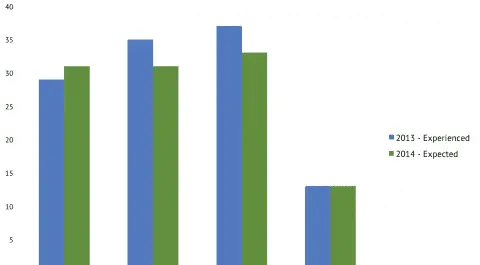The following article is archived and is no longer considered up-to-date. Please interpret its content in the context of the publishing date.

ARCHIVED
Budget Cuts in Germany: Experienced and Expected Changes in Academic Institutions
Read a summary using the INOMICS AI tool
Last year, we conducted a global survey of nearly 800 academics, asking questions about budget cuts at their respective institutions for fiscal year 2013, and their expectations for 2014. We wanted to get a sense of the climate around the world in terms of who is still being affected by the economic downturn, and to what extent, in order to better grasp the daily reality for both employers and job seekers.
In this post we’re focusing on the responses of researchers and others working in Germany. Of those who took part in our survey in Germany, 55% said they work in a university, 16% in a think tank, 10% in the government, 10% in a private company or consultancy, 4% in an international or aid organization, 2% in a bank and the remaining 2% in an NGO. This group of responses was the most diverse of any country in Europe, thereby offering interesting insight into researchers and other workers from various sectors.
Interestingly, while the percentage of people reporting budget cuts in 2013 was significantly lower than in other European countries, such as Spain, Italy, France or the UK, the reported data show little anticipated change for 2014. In fact, more people anticipated cuts to their general budgets for 2014 than 2013. These numbers indicate that although the German economy may not have been as hard hit as those in other countries, the recovery is still slow.
Following the trend of other European countries, however, reported cuts to marketing budgets were low, remaining at 13% for both 2013 and 2014. These numbers offer a positive outlook for marketing departments in academia and elsewhere across Germany.
-
- Conference
- Posted 1 week ago
46th RSEP International Conference on Economics, Finance and Business
Between 17 Apr and 18 Apr in Paris, France
-
- Postdoc Job
- Posted 6 days ago
Postdoctoral Research Fellow - New Zealand Policy Research Institute
At Auckland University of Technology (AUT University) in Auckland, New Zealand
-
- Researcher / Analyst Job
- Posted 1 week ago
Researcher in Economic Theory and Policy, Behavioural Economics, Empirical Economics, or Econometrics (75 %; EG 13 TV-L)
At Düsseldorf Institute for Competition Economics (DICE) - University of Düsseldorf in Düsseldorf, Germany














